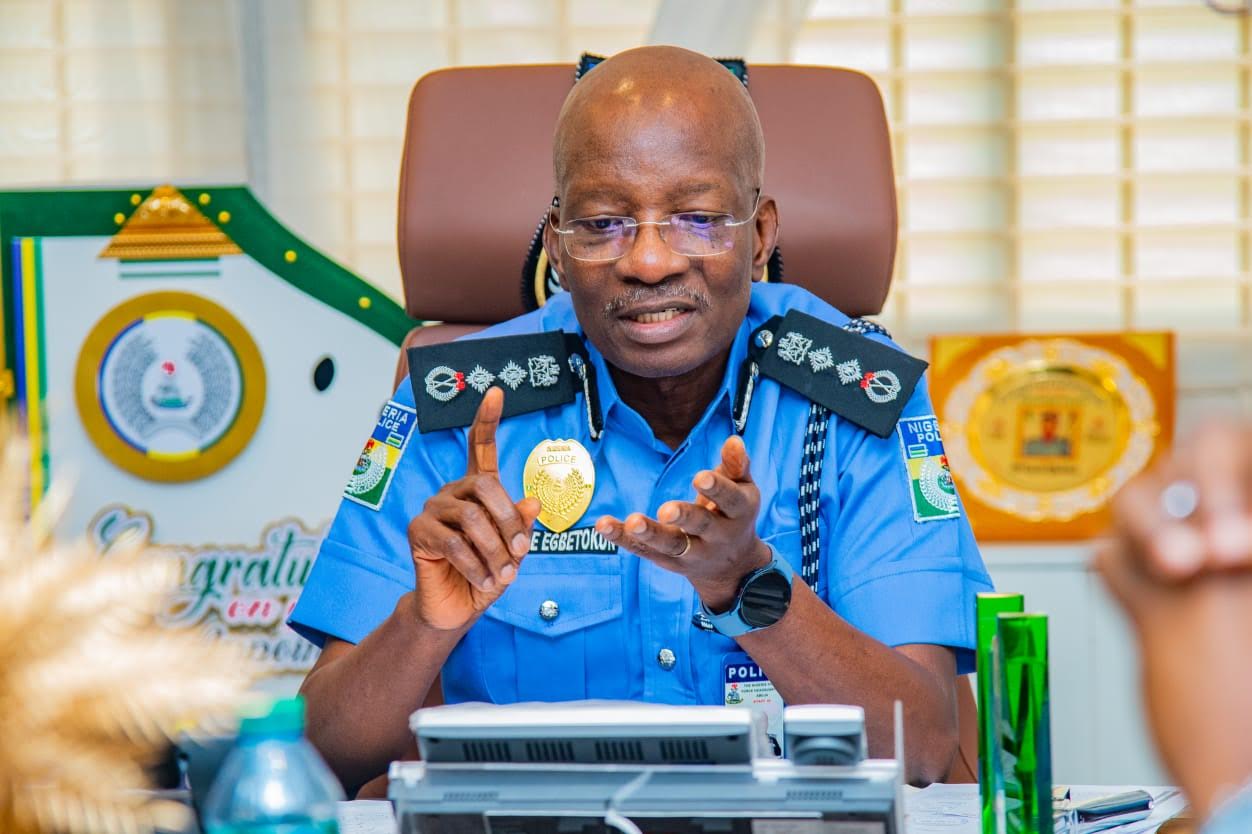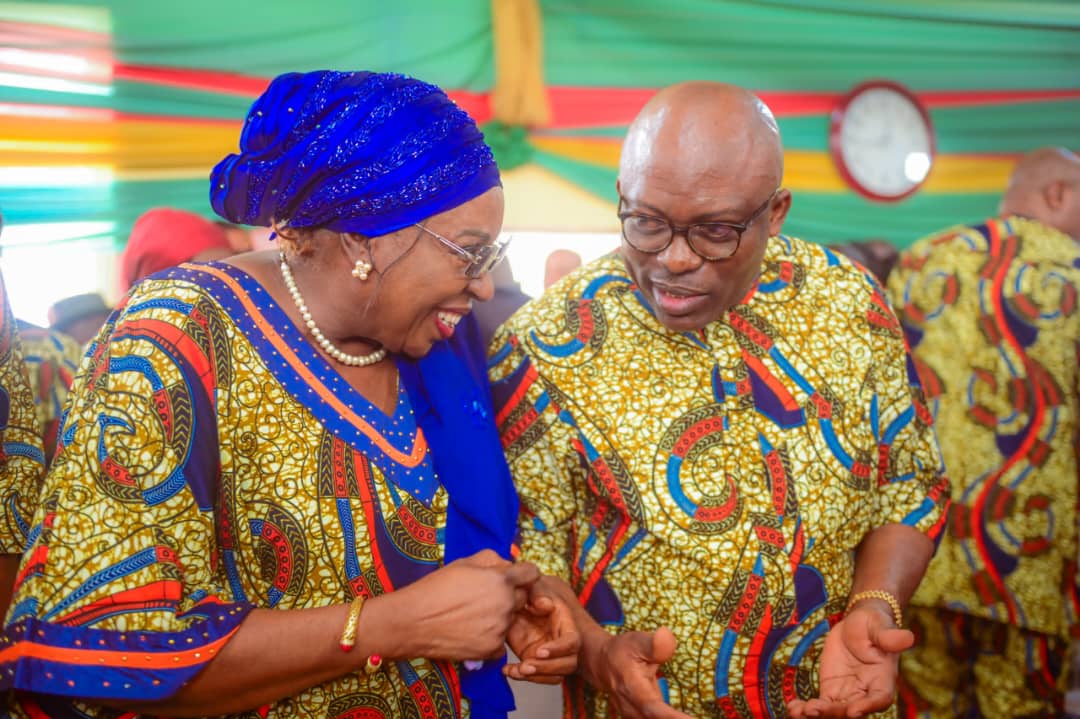News
Saraki Gives C’ttee 48hr- Deadline To Submit Budget Report …Senate Approves N1.64trn New Borrowing To Fund Deficit …Passes Police Trust Fund Bill

Senate President Bukola Saraki, yesterday, gave the Appropriations Committee till Thursday to submit the 2019 budget report.
The Vice Chairman of the Appropriations Committee, Sunny Ogbuoji told the Senate that only 24 out of 61 sub-committees had submitted their reports.
Saraki insisted that the budget report must be presented on Thursday, April 11, ahead of the April 16 approval of the money bill.
The Senate President noted the Appropriations committee will be forced to use Executive submissions if the sub-committees fail to submit their reports to the Committee by Wednesday.
Saraki said, “It is unfortunate that only 24 committees have submitted their reports. Last week, we all took a decision here that we are not going to waiver on our position. Our position is very clear: that all committees should submit (their budget reports). And those that don’t submit, then the Appropriations Committee should use the Executive submission.
“That position is still where we are. And I want to appeal to all our committees that you really have just till tomorrow (Wednesday) to make sure that your reports get to the Appropriations Committee because Thursday, you must lay this report.
“Vice Chairman of Appropriations Committee, if you don’t get report from our committees by tomorrow (Wednesday), then you just use the submission of the Executive. But come Thursday, you must lay that report.”
It would be recalled that President Buhari, had presented the N8.83 trillion budget proposal to a joint session of the National Assembly on December 19, 2018.
However, the Senate, yesterday, adopted N1.64 trillion proposed by the Executive as the amount for new borrowing to fund the 2019 budget deficit.
The upper chamber also approved the proposed N500 billion special social intervention fund.
The adoptions were parts of the 2019-2021 Medium Term Expenditure Framework (MTEF) and Fiscal Strategy Paper (FSP) passed yesterday by the upper chamber.
President Muhammadu Buhari sent the MTEF/FSP to the National Assembly on November 6, 2018 for consideration and approval.
The passage of the MTEF/FSP came as the Senate is set to receive the report of the 2019 budget from its Appropriation Committee.
The Senate adopted all the critical projections in the MTEF/FSP as proposed by the Executive.
The MTEF/FSP an annual rolling three year-expenditure plan sets out the medium-term expenditure priorities and provides the basis for the preparation of the annual national budget.
The Senate Committee on Finance, which considered the MTEF and FSP, presented its recommendations for adoption by the Senate in plenary.
Apart from the adoption of N1.64 trillion as the amount for new borrowing to fund the budget deficit, the Senate advised relevant agencies to continue to explore ways of generating additional revenues for government to bring down the fiscal deficit.
It said that the Federal Government should harness the full optimal potential of the ministry of Mines and Steel Development in terms of revenue generation to minimize the level of new borrowing.
It also said that the Federal Government should consider reducing the granting of waivers and exemptions while ensuring that the Nigerian Customs Service personnel were at all oil terminals for accountability.
The Federal Inland Revenue Service, it said, should consider increasing tax on luxury goods and services.
On the N5,000 special social intervention fund, the Senate asked for the cooperation of relevant committees in the National Assembly and other relevant MDAs in ensuring that the funds are judiciously utilized to provide tangible impact of the funds on the Nigerians.
The Senate retained the oil output of 2.3 million barrel per day, oil price benchmark of $60 per barrel, exchange rate of N305/$1, GDP Growth rate of 3.0per cent and Inflation growth rate of 9.98per cent.
Other Executive proposals for 2019 also adopted by the Senate included: proposed expenditure of N8.83 trillion, FGN retained revenue N7.92 trillion, fiscal deficit N1.86 trillion, new borrowings N1.65 trillion, statutory transfers N492.4 billion, debt service N2.14 trillion, Sinking Fund N120 billion, total recurrent (non-debt) N4.72trillion, personnel costs (MDAs) N2.29 trillion, capital expenditure N2.86 trillion, Special Intervention N500billion.
The committee said that crude oil production output stood at 2.0 million barrels as of December 2018.
According to the committee, the 2.3million daily target is achievable “due to the continuous efforts of all stakeholders in checkmating the issues of oil facilities vandalism and other vices associated with such regard.”
The committee which recommended exchange rate of N305/$1, asked the Central Bank of Nigeria (CBN) “to continue adopting strategies that will aid the strengthening of the naira and bridging the gap between the official and parallel market rate of the foreign exchange.”
The Senate also, yesterday, passed the Nigerian Police Trust Fund Bill (HB 1583).
Recall that last week, the President of the Senate, Dr. Abubakar Bukola Saraki, had promised the Inspector General of Police, Mr. Mohammed Abubakar Adamu, that the Senate would fast-track its work on both the Police Trust Fund Bill and the Police Reform Bill.
Reacting to the Senate’s passage of the Bill, which has also been passed by the House of Representatives, Saraki said: “By passing this bill, we will be creating big strides towards providing and improving security and the policing in our country.
“One of the major concerns has always been the issue of funding. We believe that this bill will provide the funding needed for training and recruitment. I am confident that by the time we lay the report on the Police Reform Bill, we would have gone a long way in moving the police in the right direction,” the Senate president said.
Similarly, the Senate, yesterday, confirmed the appointment of Maj.-Gen. Paul Tarfa (rtd) as Chairman of the North East Development Commission (NEDC).
The Senate also confirmed the appointment of Mohammed Alkali as the Managing Director and Chief Executive Officer of the NEDC, alongside nine members.
This followed presentation of report by Chairman, Senate Committee on Special Duties, Sen Abdul Aziz Nyako on confirmation of nominations into the board of the commission.
The other nominees are Musa Yashi as Executive Director Humanitarian Affairs; Muhammed Jawa as Executive Director Administration and Finance; Omar Mohammed as Executive Director Operations.
Others are David Kente, member representing North-East Zone; Asmau Mohammed, member representing North-West Zone; Benjamin Adanyi, member representing North-Central Zone.
Still others are: Olawale Oshun, member representing South-West Zone; Dr. T. Ekechi, member representing South-East; and Obasuke McDonald, member representing South-South.
Contributing, Sen Binta Masi (APC-Adamawa) observed that the Managing Director and Chief Executive Officer was from Borno State, while the headquarters of the commission was also domiciled in Borno.
She noted that in the spirit of fairness, other states facing insurgency should have been considered.
Masi noted that late Sen Ali Wakili suggested that the headquarters be domiciled in Bauchi State, but the request was turned down to allow for more negotiations, and wondered why the decision was made in favour of Borno.
In response, Nyako said the observation made by Masi was paramount, but indicated that the decision was reached during Senate and House of Representatives conference.
He said, “Recall that in our bill, we left that issue open and during the hearing, we agreed that if the headquarters should be in Borno, someone from elsewhere should be chief executive officer.
“It was the House bill that came with zoning within Borno. They had overwhelming votes in support of that during our conference and in the spirit of democracy we had to succumb.”
The Deputy Leader, Sen. Bala Na’Allah, also noted that the observation made by Masi was genuine but noted certain situations could warrant a change.
He said, “the citing of the headquarters is because the entire country associated the beginning of insurgency to Borno and other most affected states are Adamawa and Yobe states.
“So, chairman for the commission is from Adamawa and choice of Alkali is for certain convenience, which is required to galvanise support with the least inconvenience.
“Also, it should be noted that the action of the Executive led to choice of Alkali while citing of the NEDC in Borno is legislative action and in the spirit of cooperation among arms of govt we should let that go and confirm them.”
The Leader of the Senate, Ahmad Lawan, congratulated the National Assembly for passing the bill and the Executive for assenting to it and sending the list of board nominees for confirmation.
“The people nominated here are qualified and experienced and prepared to hit the ground running.
“So, I urge the committee to monitor the commission’s take-off to ensure that right things are done.
“We have learnt from issues of non smooth take-off of the Niger Delta Development Commission, so that the NEDC will learn from that. The commission needs urgent take off,” Lawan submitted.
The Deputy Senate President, Ike Ekweremadu, also congratulated the nominees.
He said the emergence of the commission was a sign that the National Assembly had concerns for happenings in Nigeria irrespective of region and other indices.
“The NDDC bill was initiated in the National Assembly. It was vetoed by the Executive, but we overturned the veto.
“It is the same spirit that led to the initiation of the NEDC. The smooth running of NDDC is due to so much protocol.
“So, from the day one of the take-off of NEDC, the National Assembly should start oversight to give life to North East and hope to other Nigerians doing business in those areas and I hope the pioneers would lay good example,” Ekweremadu said.
In his remarks, President of the Senate, Dr. Bukola Saraki, congratulated the nominees, and urged them to hit the ground running.
He also emphasised the need for oversight of the commission to ensure proper implementation of projects.
Nneka Amaechi-Nnadi, Abuja
News
Retirement: Ignore PSC’s Directive, Remain In Office, IGP Tells Officers

The Inspector General of Police, IGP Kayode Egbetokun, has instructed all police officers affected by the recent directive from the Police Service Commission (PSC) to disregard the order.
The PSC had directed officers who have served 35 years or reached 60 years of age to retire immediately.
A wireless message from the office of the Force Secretary, dated February 11, 2025, stated that the IGP “strongly directs all officers affected by the PSC’s directive to stay action, pending further instruction.” Officers were told to comply strictly with this order.
Last week, PSC spokesman Ikechukwu Ani, explained that the commission’s order followed a review of its previous stance from the 24th plenary meeting in September 2017, allowing force entrants to use their enlistment date rather than their initial appointment date.
The commission cited inconsistencies with Public Service Rule No. 020908, which mandates retirement after 35 years of service or upon reaching 60 years of age.
However, the PSC clarified that it does not have the constitutional authority to determine the appointment or retirement of IGP Egbetokun.
News
Be Consoled, God Who Gives, Also Takes, Fubara Tells Principal Secretary

Rivers State Governor, Sir Siminalayi Fubara, has extolled the sterling motherly virtues of late Mama Ayebadieye Edward Igbeta, and urged the children not to deviate from those valuable lessons she had taught them.
Late Mama Ayebadieye Edward Igbeta (79 years) is the mother of Dr Ayebaesin Jacob Beredugo, the Principal Secretary to Governor Fubara.
The Rivers State Governor, who described Dr Beredugo as a brother, trusted ally and key stakeholder of his administration, urged him to be consoled in God and bear the loss with fortitude.
Governor Fubara gave the advise at the funeral service in honour of late Mama Ayebadieye Edward Igbeta at the Cathedral Church of St Luke, Anglican Communion in Nembe City, Nembe Local Government Area of Bayelsa State yesterday.
The Rivers State Governor said: “We are here as a government to show that in this difficult time, we stand with him. We know that there is no consolation here that can fill the gap of this loss, more especially the loss of a mother.
“But, we want to draw his mind to the good Book: that it is the Lord that giveth, and it is also the Lord that taketh. And he takes for a reason.
“We live in a corrupt world, and when you are a saint in the world, when it pleases the Almighty and He believes that He doesn’t want you to be corrupted, He takes away the soul to a better place where death is no more, where you don’t have to look for food again, where you have peace.”
Governor Fubara expressed strong belief that given the way Mama had lived and the good virtues that had been read out and said about her, there is no doubt that she will be in a good side in heaven.
The Governor decried the current condition of the cathedral where the funeral service held and committed the support of the Rivers State Government to ensure the completion of the building in memory of late Mama Ayebadieye Edward Igbeta
“We have been made to understand that the Cathedral needs strong support. We are willing to support the completion of the Cathedral. We will support the building in memory of Mama with the sum of N50million”
Delivering the sermon on the topic; “Hope in the face of death”, Bishop of the Diocese of Western Izon, Rt. Rev. Victor Okporu, said those who are confidently expecting positive future must also believe in Jesus Christ, repent of their sins, and be prepared to spend eternity with Him.
Reading the biography of the late Madam Ayebadieye Edward-Igbeta, brother of the decreased, Mr Godwin Ekine, said his late sister was an embodiment of love, care, peaceful and kind-hearted, and touched lives through her generosity and compassion.
Friends and well-wishers from Bayelsa, Rivers and Delta states, some of whom shared fun memories of the late matriarch, were later hosted to a funeral reception at King Koko’s Square in Nembe Town.
Also at the burial were the State Deputy Governor, Prof Ngozi Odu; Speaker, Rivers State House of Assembly, Rt Hon Victor Oko-Jumbo; member representing Ikwerre/Emohua Federal Constituency in the National Assembly, Hon Boniface Emerengwa; and Chief of Staff, Government House, Dr Edison Ehie.
Others are Head of Service, Dr George Nwaeke; Attorney General and Commissioner for Justice, Dagogo Israel Iboroma, SAN, Dr Tamunosis Gogo-Jaja; Chief Hanny Woko; Amaopusenibo Fubara Hart; Chief Theodore Georgewill; members of the State Executive Council; Special Advisers; top politicians, leaders and stakeholders in the State; among others.
News
Old Boys Plan Rehabilitation Of GSS, Okehi
The Chairman of the Old Boys Association of Government Secondary School (GSS), Okehi Etche, Rivers State, Prof. Sir, Umunna Offor, has stated that the association would soon visit their alma-mater and rehabilitate decayed infrastructure and facilities in the compound.
The chairman made this assertion while speaking with some newsmen after an extensive meeting of the Old Boys in Port Harcourt, recently.
Sir Offor stated that since they left the secondary school, some years ago, most of the facilities and infrastructure built by then Rivers State Government had decayed and worn out.
“ However, being responsible ambassadors and Old Boys of the college, we would not fold our arms and expect government to rebuild everything in the school compound, hence, we have decided to come together and graciously assist our alma mater’, he said.
“The meeting was basically for like-minds to gather to find a way to help the school, it is a thing of joy to see and receive old school friends and comrades who have gone far in life and have excelled in their respective chosen fields”.
Speaking in the same vein, Engr, Lasbrey Amadi; (FNSE), who is also an old boy and former member of the House of Representatives, said the association would be working in synergy with the administrators of the school to ensure that in no distant time; there would be a massive face-lift in the physical infrastructure in the school compound.
Veering into politics in Nigeria of today, Engr, Amadi, said that god-fatherism in politics had seriously killed the gains and beauty of democracy in Nigeria and quickly urged politicians to always play-down the issue of god-fatherism in politics and ensure good governance in the country.
In his comment, the Public Relations Officer (PRO) of the Association, Mr Goodluck Nwaobilor, said the door of the association is still wide open for new members who finished from the school to join and work towards taking the association to higher level.
-
Business11 hours ago
Lokpobiri Condemns Abandoned Refinery Project in N’Delta … Vows Revival
-
Politics3 days ago
Controversy As Ondo Dep Gov Allegedly Incurs N130m Hotel Bill In One Year
-
News14 hours ago
Shake-ups At Federal Varsities As Tinubu Sacks UniAbuja, UNN VCs, Appoints New Leaders
-
News3 days ago
FG Unveils National Broadband Alliance To Drive Internet Access
-
Nation2 days ago
Anglican Church Inaugurates New Deanery In Etche
-
Business12 hours ago
Dangote Refinery Exports Jet Fuel To Saudi Aramco
-

 Niger Delta11 hours ago
Niger Delta11 hours agoNDDC Begins N50,000 Monthly Payment To 10,000 N’Delta Youths
-
Niger Delta3 days ago
D’Gov Emphasizes Agriculture In Industrialization … Tasks LG Health Authorities On Discipline

